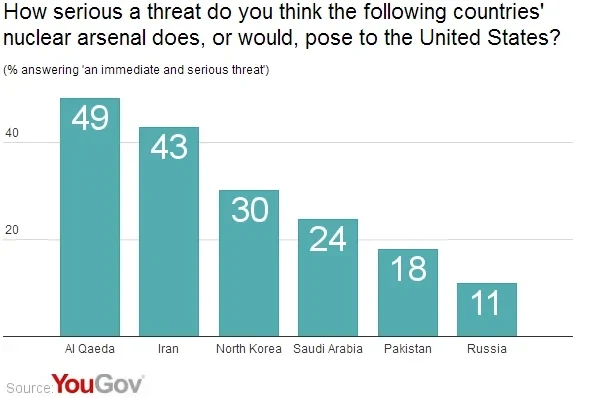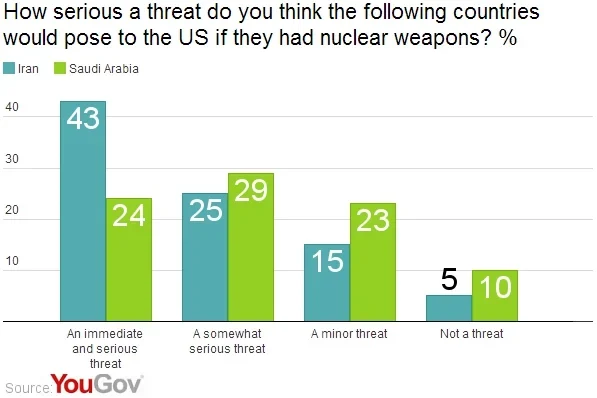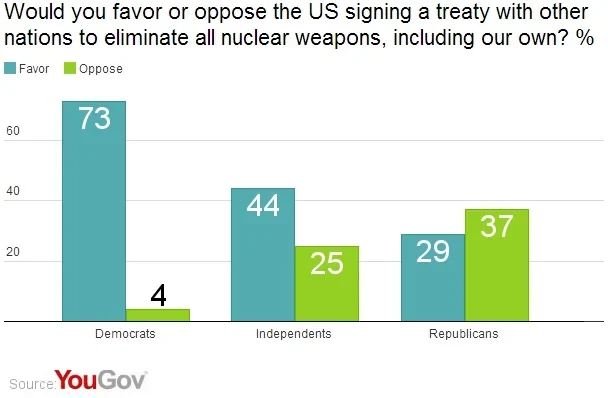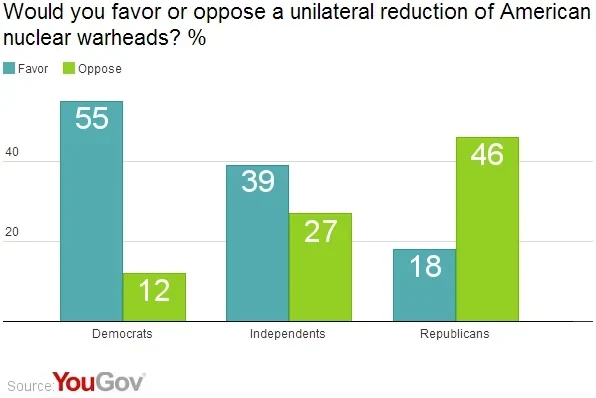Iran's potential nuclear arsenal is viewed as a very serious threat by the public, but there is wide support for universal nuclear disarmament.
Earlier this week talks in Geneva aimed at preventing Iran developing nuclear weapons witnessed a major breakthrough after Western countries – including the US – came very close to reaching an agreement with Iran. Though this round of talks ended without a final agreement, both sides are hopeful that with further talks an agreement might be reached to end sanctions in return for safeguards on Iran's nuclear program.
The latest research from YouGov shows that despite warming relations between the US and Iran, people are still very concerned with the potential of an Iranian nuclear threat.

The agreement sought with Iran would mark a seismic shift in regional alliances, and the prospect of an accord between the US/Europe and Iran has prompted vocal opposition from Israel and Saudi Arabia, currently the two closest American allies in the region. Saudi Arabia in particular has been highly distressed by the possible move and has even said that failure to act robustly and stop Iran getting a nuclear weapon will cause Saudi Arabia to try and acquire nuclear weapons, potentially from Pakistan.
In light of Saudi Arabia's threat to acquire nuclear weapons, YouGov asked how Americans feel about the US ally acquiring nuclear weapons.
About one quarter (24%) of Americans say that a nuclear Saudi Arabia would be an 'immediate and serious threat', compared to 43% who say the same about Iran, while 29% say that it would pose a 'somewhat serious threat'. Only 10% say that a potential Saudi nuclear arsenal would pose no threat, while 23% say that it would only be 'a minor threat'.

Most Americans – 51% – support the US signing a global agreement promising to decommission the nuclear weapons of every country on earth, so-called 'universal nuclear disarmament'. This conceals signficant partisan differences, however. 73% of Democrats support universal disarmament, while only 4% oppose it. Republicans narrowly tend to oppose disarmament, with 37% against it and 29% in favor of it.

Nevertheless, most Americans doubt that it will ever happen, with only 8% thinking that it will ever happen and 64% saying that it will never happen.
Similar partisan differences exist when Americans are asked whether the US should unilaterally reduce the number of nuclear weapons it has. Most Democrats (55%) support some measure of unilateral disarmament. Independents are more supportive (39%) than opposed (27%) to some unilateral disarmament, while Republicans tend to oppose (46%) it.

The US currently has the world's largest active nuclear arsenal, with a stockpile of 5,113 nuclear warheads, down from a peak of 32,225 in 1967 and 22,217 when the Iron Curtain fell in 1989. Russia has more warheads – with 8,500 – but all but 1,800 of these are out of use.
Full poll results can be found here.
Image: Getty.









